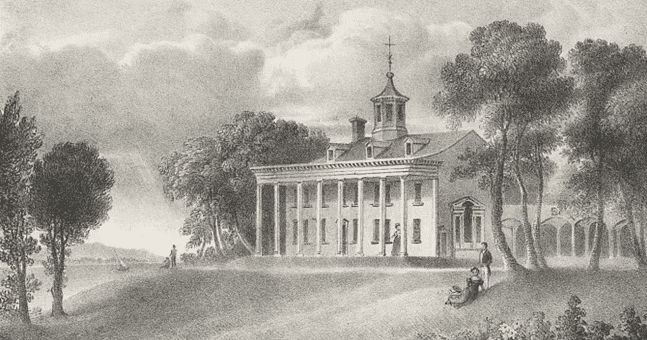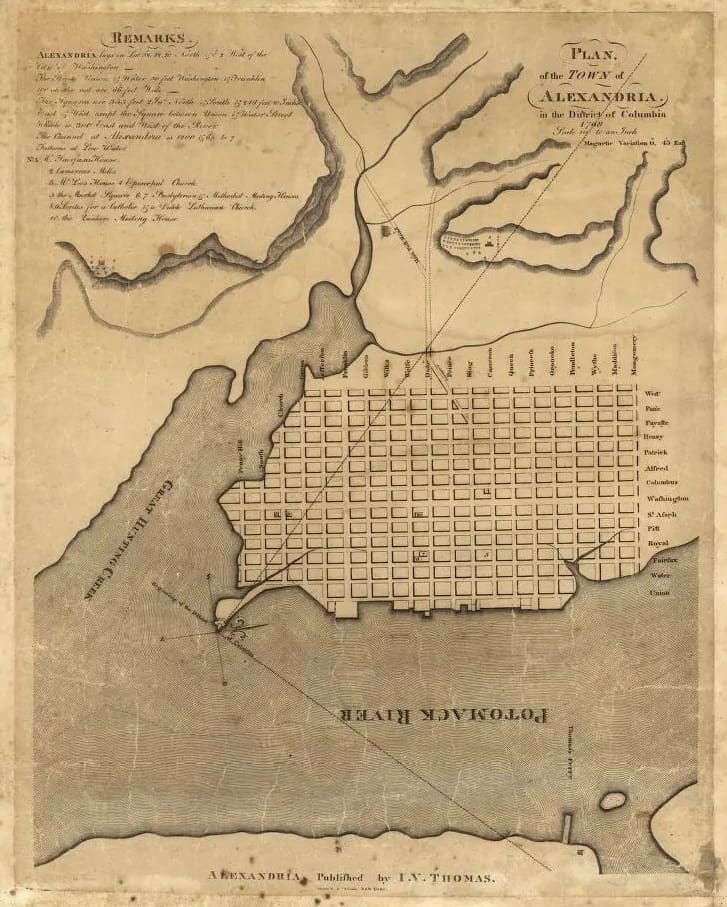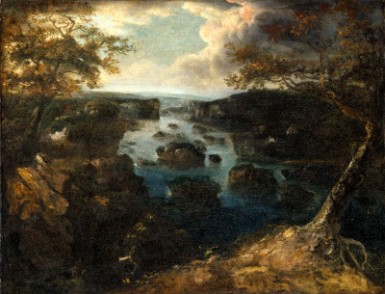
Washington and the West

Born in Ireland and described as “bred to trade,” John Fitzgerald immigrated to Virginia by 1773 and established himself in Alexandria as a merchant, gaining in that town the friendship of George Washington.1 Siding with the rebellious faction of northern Virginia, he was appointed an officer in the Fairfax County Independent Company in 1774.2 As tensions furthered with Great Britain, Fitzgerald was commissioned a Captain of the 3rd Virginia Regiment of the Continental Army on February 9, 1776.3 In the summer of 1776, the battalion was ordered to join the main army in New York and arrived in time to counter the enemy at the Battle of Harlem Heights.4
The 3rd Regiment’s Major died from wounds received at the engagement and, as senior Captain, John Fitzgerald was promoted to that rank on October 3, 1776.5 Deeming John Fitzgerald to be “an Officer of unexceptionable merit,” George Washington appointed him an aide-de-camp when an opening on his staff arose a few weeks later.6 For the next two years, Lieutenant Colonel John Fitzgerald capably served in the Commander-in-Chief’s “military family” on the fields of battle at Trenton, Princeton, Brandywine, and Germantown, and in non-battlefield conflict like the Conway Cabal incident.7 Wounded at the Battle of Monmouth on June 28, 1778, Fitzgerald thereafter left the army, returning to Alexandria to marry and resume his commercial pursuits.8 However, his military accomplishments were not yet complete. When an enemy naval force arrived before Alexandria with intentions of burning the town in April of 1781, Fitzgerald “…made so good a display for the few men he could collect that the enemy were frightened and did not land, although they were five times the number of his men.”9
With the peace of the Treaty of Paris, a French traveler observed that the people of Alexandria were at work to make their town “the center of a large commerce” and John Fitzgerald was squarely at the center of the growth.10 Among other positions, he served on the city council beginning in February 1784; sat on a local committee to examine the U.S. Constitution in October of 1787; and acted as

collector of customs for the port of Alexandria beginning in the spring of 1793.11 But of all of his undertakings, perhaps the most notable of them was his association in the Potomac Company. The venture was founded with the objective of linking the Potomac river with the fertile and booming Ohio River Valley. On May 17, 1785, John Fitzgerald was elected one of four directors of the Potomac Company and George Washington as its president.12 Fitzgerald continued in his station on the Board until September 6, 1793, when he was elected the company’s president for three years.13 Afterwards, both Washington and Fitzgerald remained involved in the affairs of the Potomac Company, with their last correspondence concerning the business being written in the summer of 1799.14 On Monday, December 2, 1799, John Fitzgerald died, and was interred two days later at the home of his wife’s family in Prince George’s County, Maryland “with military honors”.15
Samuel K. Fore
Harlan Crow Library
Notes
1. George Washington to Thomas Jefferson, 30 May 1787, Founders Online, Library of Congress; and journal entry, April 26, 1773, Founders Online.
2. Fairfax Independent Company to George Washington, 19 October 1774, Founders Online.
3. Robert L. Scribner and Brent Tarter, eds., Revolutionary Virginia: The Road to Independence, Vol. VI: The Time for Decision, 1776 (Charlottesville: University Press of Virginia, 1981), 80.
4. Gustavus B. Wallace to Michael Wallace, Sep. 18, 1776, Papers of the Wallace family, 1750-1888, Accession # 38-150, Albert & Shirley Small Special Collections Library, University of Virginia.
5. General Orders, 3 October 1776, Founders Online.
6. George Washington to John Hancock, 5 October 1776, Founders Online. A date of Fitzgerald’s appointment was evidently not recorded in general orders, but his first known draft of correspondence on behalf of General Washington was Orders to Brigadier General James Ewing, 12 December 1776, Founders Online.
7. See, for example, John Fitzgerald to George Washington, 17 March 1778, Founders Online. Interestingly, Secretary of War John Armstrong, Jr. – an aide-de-camp himself during the War for Independence – felt compelled to note, “He was a warm hearted brave and honest Irishman” on the verso of this letter in his golden years.
8. James McHenry to Elias Boudinot, July 1778, EM 9294, Thomas Addis Emmet Collection, 1483-1876, New York Public Library; Alexander Hamilton to Elias Boudinot, [5 July 1778], Founders Online; & Prince George’s County Court, Marriage Licenses, 1777-1797, p. 7, Maryland State Archives.
9. Robert Mitchell to Thomas Jefferson, 12 April 1781, Founders Online; “Nathanael Greene’s Journal,” George Washington Greene, The Life of Nathanael Greene, Major-General in the Army of the Revolution, Vol. III (New York: G. P. Putnam & Son, 1867), pp. 509-510.
10. Jacques-Pierre Brissot de Warville, New Travels in the United States of America, second edition, corrected, Vol. I. (London: J.S. Jordan, 1794), p. 367.
11. The Virginia Gazette, or the American Advertiser, Richmond, Virginia, February 28, 1784; Virginia Journal & Alexandria Advertiser, October 11, 1787; George Washington to John Fitzgerald, 28 April 1793, Founders Online.
12. George Washington to Thomas Johnson & Thomas Sim Lee, 18 May 1785, Founders Online.
13. Proceedings of the General Meetings, 1785-1796, Records of the Potomac Company, Records Group 79, National Archives & Records Administration.
14. George Washington to John Fitzgerald, 27 July 1799, Founders Online.
15. The Alexandria Times, December 5, 1799; The Times & District of Columbia Advertiser, December 3, 1799.
Sources
Griffin, Martin I. J. “Colonel John Fitzgerald, Aide-de-Camp and Secretary to Washington.” The American Catholic Historical Researches. New Series, Vol. V (1909), 61-83.
Bacon-Foster, Corra. Early Chapters in the Development of the Potomac Route to the West. Washington, D.C.: Columbia Historical Society, 1912.
Lefkowitz, Arthur S. George Washington’s Indispensable Men: The 32 Aides-de-Camp Who Helped Win American Independence. Mechanicsburg: Stackpole Books, 2003.
Reprinted from: https://www.mountvernon.org/library/digitalhistory/digital-encyclopedia/article/john-fitzgerald/
